Border Patrol agents along the United States-Mexico border in Texas had a busy February, in large part because of the cold temperatures. In fact, February was the coldest and busiest month for Border Patrol agents stationed along the southern border, the Laredo Morning Times reported. In February alone, Border Patrol agents detained 70,000 illegal aliens, compared to 58,000 over January.
Officials anticipate the surge to continue through March and April. Both are times Border Patrol tends to see an influx in illegal crossings, primarily because of the cooler temperatures and the increased need for seasonal labor in the United States.
The Times details the struggle agents are currently facing:
The number of migrants taken into custody last year jumped 39 percent from February to March, and a similar increase this month would push levels to 100,000 detentions or more.
It was a surge in the border numbers in March 2018 that infuriated Trump and launched his administration's attempt to deter families by separating children from their parents. Trump stopped the separations six weeks later to quell public outrage. But the controversy the policy generated - and its widely publicized reversal - is now viewed by U.S. agents as the moment that opened the floodgates of family migration even wider, worsening the problem it was meant to fix.
While arrests along the border fell in recent years to their lowest levels in half a century, they are now returning to levels not seen since the George W. Bush administration, driven by the record surge in the arrival of Central American families.
For U.S. border agents, the strain has grown more acute, as they struggle to care for children using an enforcement infrastructure made in an era when the vast majority of migrants were Mexican adults who could be quickly booked and deported. The Central American families - called "give-ups" because they surrender instead of trying to sneak in - have left frustrated U.S. agents viewing their own role as little more than the facilitators for the last stage of the migrants' journey. They are rescuing families with small children from river currents, irrigation canals, medical emergencies and freezing winter temperatures.
Recommended
When the Central American caravans were arriving in the fall, the Department of Homeland Security's focus was on California, Arizona and New Mexico. President Donald Trump sent troops to the border but that shifted the crossing points further into Texas.
One of the issues agents face is the lack of manpower. The drug cartels are using the flooding of illegal aliens as a diversion in the Rio Grande area since only one agent covers the area. It forces the agent to stay near the riverbank, allowing the cartels to continue their drug smuggling.
DHS plans to expand their pilot program, called Migrant Protection Protocol, which is currently taking place in San Ysidro, along the California border. Aliens who apply for asylum are sent to Mexico to wait while their claim is processed. El Paso is expected to see the program begin in their area.
Mexican officials have taken an active role in this process. They have established the Estas en Tu Casa plan (translated to "This is Your Home"). Asylum seekers would be given identifying documentation, jobs for adults and school for kids. The only catch was that they would have to stay in Mexico's two southernmost states of Chiapas and Oaxaca.

























Join the conversation as a VIP Member